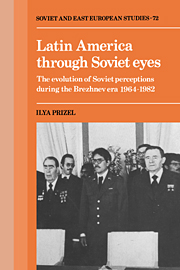 Latin America through Soviet Eyes
Latin America through Soviet Eyes Book contents
- Frontmatter
- Contents
- Preface
- Acknowledgments
- Introduction
- Part I Soviet perceptions of Latin America's global role
- Part II Soviet perceptions of Latin American social structures
- Part III Soviet–Latin American relations during the Brezhnev era
- Part IV Conclusion: the emerging Soviet perception of Latin America and the future of Soviet policy toward the hemisphere
- Conclusions
- Epilogue – Latin America: the Long March
- Notes
- Bibliography
- Index
Epilogue – Latin America: the Long March
Published online by Cambridge University Press: 05 February 2012
- Frontmatter
- Contents
- Preface
- Acknowledgments
- Introduction
- Part I Soviet perceptions of Latin America's global role
- Part II Soviet perceptions of Latin American social structures
- Part III Soviet–Latin American relations during the Brezhnev era
- Part IV Conclusion: the emerging Soviet perception of Latin America and the future of Soviet policy toward the hemisphere
- Conclusions
- Epilogue – Latin America: the Long March
- Notes
- Bibliography
- Index
Summary
Mikhail Gorbachev's election as General Secretary signaled a major shift in Soviet perceptions of the Third World. Unlike his predecessors, Gorbachev did not attempt to use ideological success in the Third World as a substitute for economic performance within the USSR.
From the start, Gorbachev argued that the key determining factor in the global “correlation of forces” lay in the strength of the Soviet economy and its ability to adapt to high technology.
The new emphasis on the USSR's own economic performance has had several profound effects on Soviet policy in the Third World. Karen Brutents, for example – one of the Central Committee's key authorities on the area – has noted that the USSR stands to gain far more from closer ties with non-Marxist Third World countries such as Brazil and Mexico than from economically insignificant countries that might profess a “socialist orientation.” Thus, while Soviet aid to Ethiopia, Angola, Cuba, Nicaragua, and Vietnam has continued at high levels, the USSR has appeared to be reluctant to seek new Third World allies that might well become burdens.
Gorbachev's perestroika, with its emphasis on ever-greater Soviet participation in the international division of labor, led Moscow to seek improved political and economic links with those Third World countries that might buy Soviet industrial goods and commodities or sell needed technology to the USSR. This “new thinking” resulted in Soviet overtures toward the ASEAN bloc, Saudi Arabia and the Gulf states, and most dramatically toward Latin America.
- Type
- Chapter
- Information
- Latin America through Soviet EyesThe Evolution of Soviet Perceptions during the Brezhnev Era 1964–1982, pp. 188 - 202Publisher: Cambridge University PressPrint publication year: 1990


